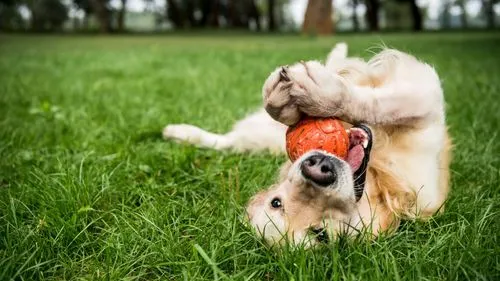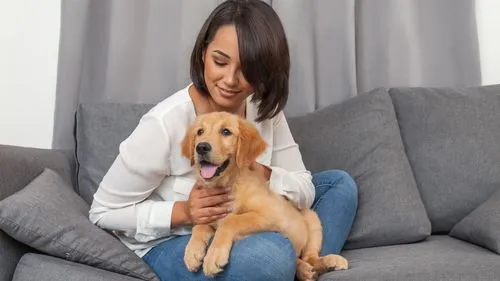How to choose the best puppy and your perfect companion
May 31, 2025
Katka

The importance of picking the right puppy
Choosing a puppy is an important and exciting decision. The puppy you pick today will grow into a loyal companion, and making the right choice can ensure you find a dog that perfectly fits your lifestyle and household. With so many adorable puppies to choose from, it's easy to focus only on cuteness. However, there are several key factors you need to consider to select the best puppy: temperament, breed, health, and even future size. In this guide, we’ll walk you through how to pick a puppy, what to look for in a litter, and how to ensure your puppy grows into a healthy, happy adult dog.
Whether you’re looking for a family dog, a companion for your single life, or an energetic playmate, we’ll show you how to make an informed decision and bring home the puppy of your dreams.
Choosing the right breed for your lifestyle
Each breed has its own unique characteristics, making it essential to choose a puppy that matches your lifestyle. The breed you select will directly influence the puppy’s energy level, temperament, size, grooming needs, and health considerations. Understanding the inherent traits of various breeds will help you make a more informed choice and ensure a harmonious relationship between you and your new dog.
Note: When choosing a breed, consider how much time you can dedicate to exercise, grooming, and socialization, as some breeds require more care than others.
Best breeds for active people
If you lead an active lifestyle, you'll want a dog that can keep up with you. Some dog breeds are known for their high energy, athleticism, and love of outdoor activities. These breeds enjoy running, hiking, and playing, making them ideal companions for active individuals or families who spend a lot of time outdoors.

Border collies
Known for their intelligence and incredible stamina, Border Collies are one of the most energetic breeds out there. They are often used as working dogs due to their herding instincts, and they need a lot of physical and mental stimulation. If you enjoy long hikes, agility training, or any fast-paced activity, this breed is perfect for you.
Labrador retrievers
Labs are one of the most popular dog breeds worldwide, thanks to their friendly and outgoing nature. They are excellent companions for active individuals who enjoy activities like swimming, running, or playing fetch. Labradors also excel in activities like hunting and field trials due to their strong retrieving instincts.
Australian shepherds
With their natural herding instincts and love for physical exercise, Australian Shepherds thrive in active environments. These dogs are incredibly intelligent and require both physical and mental challenges to stay happy. If you engage in outdoor activities like running, hiking, or even sports like frisbee, an Australian Shepherd can make a great partner.
German shepherds
Often used in police and military work due to their intelligence and trainability, German Shepherds are strong, active, and highly protective. They thrive in environments where they can be both physically and mentally stimulated. Long walks, obedience training, and challenging games are great for this breed.
Siberian huskies
Huskies are famous for their endurance and strength, initially bred as sled dogs. They are perfect for people who love long runs, especially in cooler climates. Their playful and friendly nature makes them great companions for those who lead a high-energy lifestyle. Just be prepared to meet their exercise needs, as they are known to be escape artists if they get bored.
These breeds excel in homes where there is plenty of space to run and play, and they can keep up with owners who enjoy a variety of physical activities. However, without enough exercise, these dogs may develop behavioral issues like excessive barking or destructive chewing.
Best breeds for families
Choosing the right breed for families, especially those with young children, requires finding a dog with a gentle temperament, patience, and a high tolerance for the often unpredictable behavior of children. Family-friendly dogs are typically affectionate, loyal, and enjoy being around people.

Golden retrievers
Golden Retrievers are the quintessential family dog. Known for their friendly, tolerant, and gentle nature, they are great with children of all ages. Their easy-going temperament makes them adaptable to family life, and they enjoy participating in fun family activities, whether it's a game of fetch or a lazy day at home.
Beagles
Beagles are energetic, curious, and generally good-natured dogs. Their small to medium size makes them manageable for families with younger children. Beagles love to play and explore, making them great companions for outdoor activities like walks or games in the yard. Their strong sense of smell and curiosity might get them into trouble, so a secure backyard is a must!
Cocker spaniels
With their affectionate, happy-go-lucky personalities, Cocker Spaniels make wonderful family pets. They are known for being gentle and easy to train, which makes them ideal for families with children. This breed enjoys both playing with kids and snuggling on the couch, offering the best of both worlds.
Cavalier King Charles spaniels
These small dogs are affectionate and love to be with their families. They have a calm and gentle temperament, making them great for households with younger kids. Cavaliers are also highly adaptable and can be as active or as laid-back as their owners, making them versatile companions.
Boxers
Boxers are playful, energetic, and known for their boundless enthusiasm. Despite their strong appearance, they are extremely affectionate and protective of their families, making them a great option for households with kids. Their energy levels make them suitable for families who can provide plenty of playtime and exercise.
These breeds are patient and adaptable, often excelling in environments where they can interact with children. They are loyal and affectionate, but they also require proper training and socialization to ensure they interact appropriately with all members of the family.
Best breeds for singles or apartment living
If you live alone or in an apartment, your lifestyle may be better suited to smaller breeds or those that require less physical space and exercise. These dogs can adapt to smaller living areas but still provide excellent companionship.

French bulldogs
French Bulldogs are known for being low-energy dogs that are perfect for apartment living. Their small size and minimal exercise needs make them ideal for individuals who live in the city or smaller homes. Despite their laid-back nature, Frenchies are affectionate and love spending time with their owners.
Pugs
Pugs are charming little dogs with big personalities. They are known for their easy-going nature and adaptability, which makes them great for apartment dwellers. Pugs require only moderate exercise, like short walks, and they are equally happy lounging around with their owners. Their affectionate and comical demeanor will keep you entertained.
Shih tzus
Known for their friendly and outgoing personalities, Shih Tzus are a great option for people living in smaller spaces. Despite their luxurious coats, they don’t require excessive exercise, and a short walk each day is often enough. Shih Tzus are also known for being relatively quiet compared to other small breeds, making them ideal for apartment life.
Dachshunds
These adorable “wiener dogs” are small in size but full of personality. They are playful, independent, and make great companions for single people. Dachshunds require moderate exercise and are content with short walks, making them well-suited for apartment living. However, their strong sense of independence means they may need a little extra training.
Cavalier King Charles spaniels
Though previously mentioned as a good family dog, Cavaliers also make excellent companions in apartments. They are adaptable dogs that can be as energetic or relaxed as their environment allows. Their small size and gentle nature make them a great fit for small living spaces.
These breeds thrive in homes where they are the center of attention and don't require vast spaces to run around. They are typically low-maintenance when it comes to exercise, but they still crave attention, love, and some mental stimulation.
Puppy from a breeder vs. shelter
Once you’ve decided on a breed, the next step is deciding where to get your puppy. There are benefits to both purchasing from a breeder and adopting from a shelter.
Buying dog from a breeder
When buying puppy from a breeder, ensure that the breeder is reputable. Ask for health certificates, visit the breeding facility, and meet the puppy’s parents if possible. Reputable breeders will provide you with a well-socialized, healthy puppy with a known genetic history.
Adopting from a shelter
Adopting from a shelter is another fantastic option, and it saves a life. Shelter puppies may not have as clear of a background, but shelters often provide health assessments and vaccinations before adoption. You can also find a variety of mixed breeds with wonderful personalities.
When choosing from a shelter, ask about the puppy’s history, temperament, and health. Shelters often allow you to spend time with the puppy before making a decision.
Not sure whether to get a dog from a breeder or a shelter? Discover all the pros and cons in our article Adopting from a shelter vs. Buying from a breeder.

What to look for in puppy when buying
It's not just about the breed of dog but also about the particular puppy you end up taking home. With dogs it's like with people, every piece is original. While the breed gives us a genetic premise, the reality can vary. Some dogs are friendly, others are loners, some are fearful others are fearless. So how do you choose the best puppy from the litter just for you? Take your time and focus on the puppy's health, temperament and behavior.
Puppy's physical health
Physical health is a key factor to consider when choosing a puppy. A healthy puppy will not only bring you more joy but will also reduce potential vet bills in the future.
Chceck these signs of a healthy puppy:
- Eyes and ears: Check the puppy’s eyes—they should be bright, clear, and free of discharge. The ears should be clean, with no foul odor, as this can be a sign of ear infections.
- Coat condition: A puppy’s fur should be smooth, shiny, and free of bald spots or irritation. Healthy fur indicates proper nutrition and care.
- Weight and body condition: A healthy puppy has a rounded belly but shouldn’t appear overly bloated, as this could indicate worms. Make sure the puppy isn’t too thin or excessively chubby.
- Energy level: Healthy puppies are active and curious, with playful energy. However, they should also be able to settle down and rest when needed.
Note: When choosing a puppy, it’s essential to evaluate their health to ensure that they’re free from common issues like infections, parasites, or malnutrition. Reputable breeders and shelters will provide health records, including vaccinations and deworming treatments.
Puppy's temperament
One of the most important aspects of choosing a puppy is selecting one with the right temperament. Puppy temperament can significantly affect their behavior as they grow up. Whether you’re looking for a calm, loving puppy or a playful and energetic one, understanding how to pick out a puppy with a good temperament is crucial.
When meeting puppies, observe their reactions to new stimuli and people. A well-tempered puppy should display curiosity without showing excessive fear or aggression. Consider performing a few simple temperament tests:
- Touch sensitivity test: Gently handle the puppy’s paws, ears, and tail. Does the puppy allow handling without too much squirming or nipping? Puppies that respond calmly to touch are more likely to be good companions.
- Noise response test: Drop a soft object, like a toy, near the puppy to create a noise. Watch how they react. Does the puppy investigate curiously, or do they retreat in fear? A confident puppy will approach new sounds without anxiety.
- Socialization test: Hold the puppy and observe their body language. Are they relaxed and comfortable, or are they tense and trying to squirm away? Puppies that are comfortable being held are often easier to bond with.
“Puppies that show balanced responses tend to make the best pets.“
Puppies that show balanced responses—curiosity without excessive fear or aggression—tend to make the best pets. Overly aggressive or extremely shy puppies might face behavioral challenges as they grow.
Puppy size estimation
One of the most common concerns for new puppy owners is predicting the future size of their dog. Knowing how big your puppy will get can help you prepare for their future needs in terms of space, exercise, and care.
- Check the paws: One of the easiest ways to tell how big a puppy will get is by looking at its paws. Puppies with larger paws often grow into larger dog.
- Look at the parents: If you’re purchasing from a breeder, ask to see the puppy’s parents. The size of the parents will give you a good indication of how large the puppy will grow.
- Breed considerations: Different breeds have different growth rates. For example, large breeds like Great Danes and Saint Bernards grow very quickly in their first year, while smaller breeds like Chihuahuas or Yorkies may stay small even as adults.
Additionally, mixed breed puppies can be harder to predict, but knowing the breeds involved can still give you an idea of the potential size range.

What to bring when picking up a puppy
Bringing your new puppy home is exciting, but preparation is key. Before picking up your puppy from the breeder or shelter, make sure you have all the essentials.
- Crate or carrier: A safe and secure way to transport your puppy home. Even when travelling by car with your dog, it is important to follow the safety guidelines.
- Leash and collar: Even if your puppy is small, it’s essential to have a collar and leash for control.
- Puppy pads: Puppy pads can help manage accidents, especially during the first car ride.
- Water and food bowls: Make sure to have water available, especially if you’re traveling a long distance.
You’ll also want to puppy-proof your home by removing hazardous items and ensuring that your puppy has a designated safe space to settle in.
How to bond with your puppy
The first few weeks with your new puppy are crucial for building a strong bond. Puppies thrive on attention and structure, so it’s important to establish a routine early on. Bonding with your puppy will strengthen your relationship and make training easier as they grow.
How to get a puppy to like you? Spend time together! Puppies bond quickly with those who spend time playing and caring for them. Engage in activities that your puppy enjoys, like fetch or gentle tug-of-war. Use treats and praise to reward your puppy when they display good behavior. Puppies respond well to positive training methods.
Additionally, tools like the Barkio dog monitor can help you keep an eye on your puppy when you’re away, ensuring they feel secure and cared for even when you can’t be physically present. This way, you can track their activity, barking, and rest times, helping you maintain consistency in their routine.

Also, don't forget about dog socialization. Introduce your puppy to new environments, people, and other dogs. Socialization during the early weeks can help prevent behavioral issues later on.
FAQs about picking and raising a puppy
1. How to tell how big your puppy will get
You can estimate how big your puppy will get by looking at their paws—larger paws often indicate a larger adult dog. Also, consider the puppy’s breed and the size of the parents to get a more accurate prediction of their future size.
2. What is the best age to get a puppy from a breeder?
The ideal age to bring home a puppy is between 8 and 12 weeks. Puppies that are taken home too early may miss out on important socialization with their littermates.
3. Can a dog have just one puppy?
Yes, although rare, some dogs can have just one puppy in a litter, a phenomenon known as a singleton puppy.
4. What do you need when getting a puppy?
Essential items include a crate, leash, collar, food, water bowls, toys, and puppy pads for house training.
5. How to pick a puppy with a good temperament?
To pick a puppy with a good temperament, look for one that is curious, social, and not overly shy or aggressive. Simple tests, like gentle handling or observing interactions with littermates, can help reveal the puppy’s temperament.
Conclusion: Enjoying life with your new puppy
Choosing the best puppy involves careful consideration of temperament, breed, health, and your lifestyle. By understanding what to look for and how to assess a puppy’s potential, you can bring home a companion that will bring joy to your life for years to come. Whether you choose a puppy from a breeder or shelter, the key is to pick a puppy that fits your needs and makes you happy.
Continue reading...
Show all articlesCopyright & trademark notices
Apple, the Apple logo, and iPhone are trademarks of Apple Inc., registered in the U.S. and other countries and regions. App Store is a service mark of Apple Inc. Mac App Store is a service mark of Apple Inc. Google Play and the Google Play logo are trademarks of Google LLC. Windows® and the Windows logo are either registered trademarks or trademarks of Microsoft Corporation in the United States and/or other countries. Linux® is the registered trademark of Linus Torvalds in the U.S. and other countries.


